Empowerment Through Advocacy: How I Became Active in my Medically Complex Child’s Care
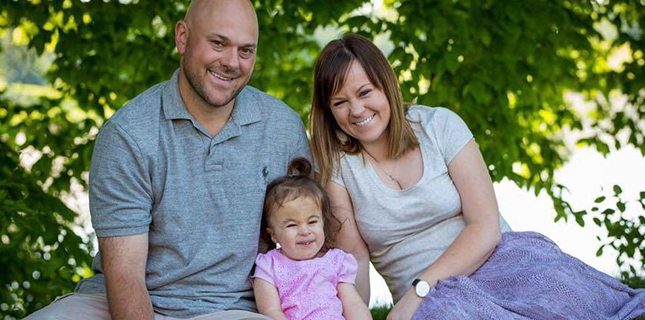
Molly is a supporting documentation specialist PHS and mom to three year old Addyson.
When my daughter Addyson was born at 38 weeks (you can read our whole story here), we knew there was a chance she would have medical complexities. Her Trisomy 18 diagnosis was confirmed shortly after birth, and at that point my husband Mike and I were given the option to take our daughter off the ventilator and let her pass away naturally – a scenario we weren’t willing to consider.
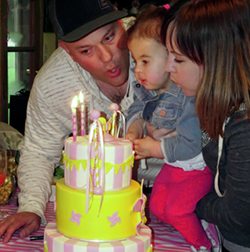
Addyson is now three years old, attends preschool with her peers, and is the light of our lives. Since the very beginning, Mike and I have been dedicated advocates for her care, her future, and her wellbeing – addressing her needs with doctors, teachers, and any other people involved in her routine care. When I considered how much time we spent making sure our daughter was receiving the best care, it made sense to become involved in advocacy programs organized through hospitals and groups in the metro area. Through Children’s Minnesota and PACER Center, I work collaboratively with health care professionals and other families to improve care and experiences for Addyson and other medically complex children – and these are just two of many ways families can become active advocates.
A dynamic group of families
Addyson receives her care through Children’s Minnesota, so when a case manager told me about their Family Advisory Council I knew it would be an opportunity to not only build our community, but be involved in promoting patient-centered care and positive change.
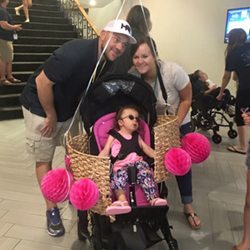
This group is comprised of families whose children have received care at one of Children’s facilities, so we are all personally invested in bringing our feedback and knowledge to the staff we work alongside – and the staff are looking for real family input and perspective.
Being involved in this council has helped us feel like we’re actively making a difference for Addyson, and gives us a way to feel like we’re taking the experiences we’ve encountered over the past three years to help pave the road for families who will come after us. We’ve created materials to connect parents to support and information, documents to organize and track medical information, and more.
If you’re interested in joining the Family Advisory Council, you can read more about the process and complete the application form at the bottom of this page.
Bringing doctors to our home
It can be challenging for doctors who are hospital- or clinic-based to understand what the day to day life of having a child with medical complexities entails. One obvious way to give them better insight into a patient’s home life is to show them just that.
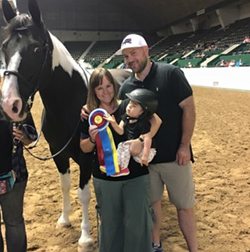
We recently got involved with a quarterly program coordinated through PACER Center called the Pediatric Resident Training Program, which brings resident doctors into families’ homes to have a casual conversation about what a day in your life looks like and normalize the living that happens outside medical buildings. This gives the residents an opportunity to see what reality looks like for their patients, consider what can be done to help these children live happily at home, and have a conversation with families about what makes care collaborative and coordinated.
While we have only had one visitor so far, I’m looking forward to this opportunity to have productive conversation with resident doctors in hopes of leading to even better care and more understanding from everyone involved in our child’s care.
Finding your own focus
I’ve briefly described the two organizations we’ve gotten involved with recently, but I know that each person has walked their own path and advocacy may look immensely different from one family to the next. Maybe you’re not at a point where you’re ready to formally join an advisory council or group, but I encourage any family who has a child with medical complexities to be an advocate in one way or another.
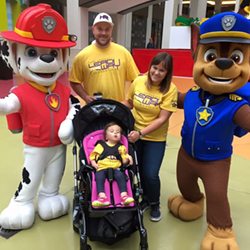 Maybe feeling empowered in your kiddo’s care means writing letters to your local legislators letting them know about the need for smart legislation to keep your child at home (PHS has information and resources for finding your Senator and Representative, as well as a letter or email template). Or it could mean walking into an appointment with your child’s doctor holding a list of questions you want to ask so that you leave feeling confident instead of unsure.
Maybe feeling empowered in your kiddo’s care means writing letters to your local legislators letting them know about the need for smart legislation to keep your child at home (PHS has information and resources for finding your Senator and Representative, as well as a letter or email template). Or it could mean walking into an appointment with your child’s doctor holding a list of questions you want to ask so that you leave feeling confident instead of unsure.
No matter where your comfort level lies right now, when parent voices are heard and opportunities to make positive change are embraced, children win. Our kiddos deserve the best, and as we go through this journey alongside them, we start to get a better understanding of what our role looks like. Being your child’s advocate on any level is an empowering and productive role – and I encourage you to find out what that looks like for you and your family.
Originally published: January 24, 2018


Being an advocate for your child is wonderful. I was a medically involved child. I am now 60 years old and when I look back on my childhood I just see a black hole. I lost my childhood. No one took the time to help me understand why I was going thru all the things that were happening to me. I can still remember begging a nurse not to take me to the operating room. I felt good and all I knew was when I came out I was going to hurt really bad. No one ever listened to me or helped me understand what was happening. Please get a child advocate to help your child has she grows to understand why and what is happening to her and why she has no choice or voice in the issue
Patty
Thank you for your comment, Patty. I’m sure your experience has allowed you to help so many others in need of advocacy. Have a great day!